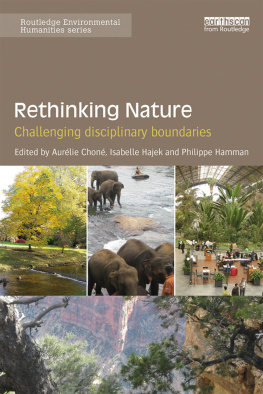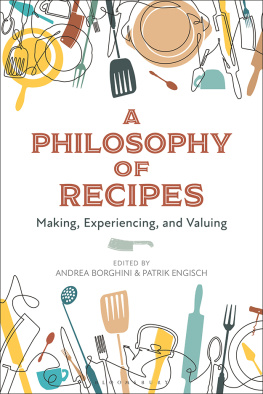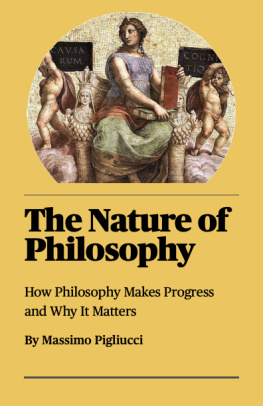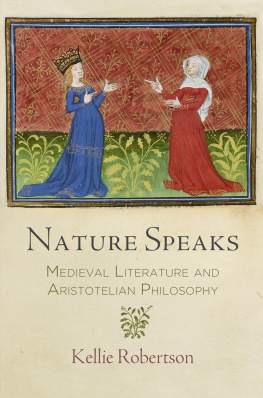First published 2017
by Routledge
2 Park Square, Milton Park, Abingdon, Oxon OX14 4RN
and by Routledge
711 Third Avenue, New York, NY 10017
Routledge is an imprint of the Taylor & Francis Group, an informa business
2017 Aurlie Chon, Isabelle Hajek and Philippe Hamman
The right of the editors to be identified as the authors of the editorial material, and of the authors for their individual chapters, has been asserted in accordance with sections 77 and 78 of the Copyright, Designs and Patents Act 1988.
All rights reserved. No part of this book may be reprinted or reproduced or utilised in any form or by any electronic, mechanical, or other means, now known or hereafter invented, including photocopying and recording, or in any information storage or retrieval system, without permission in writing from the publishers.
Trademark notice: Product or corporate names may be trademarks or registered trademarks, and are used only for identification and explanation without intent to infringe.
British Library Cataloguing-in-Publication Data
A catalogue record for this book is available from the British Library
Library of Congress Cataloging-in-Publication Data
A catalog record for this book has been requested
ISBN: 978-1-138-21492-7 (hbk)
ISBN: 978-1-138-21493-4 (pbk)
ISBN: 978-1-315-44476-5 (ebk)
Typeset in Bembo
by Apex CoVantage, LLC
Hicham-Stphane Afeissa is Professor of Philosophy at Dijon and holds a PhD in philosophy and in geosciences and environment. He is a research associate at the University of Franche-Comt.
ric Baratay is Professor of History (history of nature and animals) at the Faculty of Letters and Civilization, University Jean Moulin, Lyon 3. As a researcher he is a member of the LARHRA (Laboratoire de Recherche Historique Rhne-Alpes, UMR 5190).
Nathalie Blanc is Research Director at the CNRS and the Director of the Laboratory LADYSS (UMR 7533 CNRS) at the University Paris Diderot-Paris 7. Her research focuses on nature in urban settings and on environmental aesthetics.
Roland Borgards is Professor in German Literature at the Institute for German Philology and Director of the Graduate School for the Humanities at the University of Wrzburg, Germany. His research focuses on cultural and literary animal studies, Georg Bchner and Romanticism.
Nicolas Buclet is Full Professor in Urban Planning (sustainable development, social ecology, economics of conventions) at the Urban Planning Institute of Grenoble, University of Grenoble Alpes. As a researcher he is a member of the team Villes et Territoires at the PACTE Laboratory.
Lionel Charles , a philosopher, has been working as an independent social science researcher at Fractal, a private research unit located in Paris, on different environmental topics (air quality, climate change, environmental health, risk, etc.) in an historical and epistemological perspective.
Aurlie Chon is Associate Professor in German Cultural Studies (literature and history of ideas) at the Faculty of World Languages and Cultures, University of Strasbourg, France. She holds the accreditation to supervise research in German studies and is attached to the Laboratory EA 1341 German Studies. She co-edits the journal Recherches germaniques .
Laurence Dahan is Professor in Comparative Literature at the Faculty of Literature and Human Sciences, University of Franche-Comt, France. She is the head of the Center for Interdisciplinary and Transcultural Studies (CRIT, EA 3224), editor in chief of the online journal pistmocritique and director of the website pistmocritique.org which publishes electronic books on science and literature.
Isabelle Hajek is Associate Professor in Sociology of the Environment (environmental movements and urban ecology) at the Institute for Urbanism and Regional Development, University of Strasbourg, France. She is attached to the CNRS/University of Strasbourg Laboratory SAGE (Societies, Actors and Government in Europe, UMR 7363).
Philippe Hamman is Professor of Sociology (sociology of the environment and sustainability, urban sociology) at the Institute for Urbanism and Regional Development, University of Strasbourg, France. He is the Vice Dean for Research of the Faculty of Social Science and Deputy Director of the CNRS/University of Strasbourg Laboratory SAGE (Societies, Actors and Government in Europe, UMR 7363).
Owain Jones is a Professor of Environmental Humanities in the College of Liberal Arts, Bath Spa University, UK. He is currently leading a large multiuniversity project funded by the Art and Humanities Research Council on communities, water and ecological citizenship.
Catherine Larrre is Emeritus Professor at the University of Paris 1-Panthon-Sorbonne (Centre de Philosophie Contemporaine de la Sorbonne, ISJPS, UMR 8103). Trained in moral and political philosophy, she has been working on environmental philosophy, environmental ethics and philosophy of technology since 1992.
Margot Lauwers is Adjunct Professor in American Studies and Language (cultural studies, literature, translation and language) at the Faculty of Applied Languages at the University of Perpignan, France. Her research focuses on ecofeminism in contemporary Anglophone literature. She is attached to the CRESEM Laboratory EA 7397 and is an assistant editor of Ecozon@: European Journal of Literature, Culture and Environment.
Jean-Pierre Lvy is Research Director (urban and social geography, habitat and urban ecology) at the CNRS. He is a member of the Laboratory LATTS (Techniques, Territories and Societies, UMR 8134) of CNRS, Marne-la-Valle University and Ponts ParisTech School.
Dennis L. Merritt has a PhD in entomology from the University of California-Berkeley and is a graduate of the C. G. Jung Institute of Analytical Psychology in Zurich, Switzerland. He is a senior analyst and instructor at the C. G. Jung Institute of Chicago.
Roldan Muradian holds a PhD in ecological economics from the Autonomous University of Barcelona, Spain. He has worked for the universities of Tilburg and Nijmegen in The Netherlands. Currently he is Visiting Professor at the Faculty of Economics of the Universidade Federal Fluminense, Rio de Janeiro, Brazil. His research investigates the interface of environmental governance and economic development.
ric Navet is Emeritus Professor of Anthropology at the University of Strasbourg (Institute of Ethnology and Laboratory SAGE Societies, Actors and Government in Europe, UMR 7363). His fields of interest are ethnoecology, ways of being, thinking and acting, shamanism and ethnohistory.
Emmanuelle Peraldo is an Associate Professor in British eighteenth-century literature at the University Jean Moulin, Lyon 3, and a member of the Institut dtudes Transtextuelles et Transculturelles (IETT, EA 4186). Her current research focuses on the link between geography and literature in the early modern period.
Catherine Repussard is Senior Lecturer in German Cultural Studies (literature and history of ideas) at the Faculty of World Languages and Cultures, University of Strasbourg, France. She holds the accreditation to supervise research in German studies and is attached to the Laboratory EA 1341 German Studies. She co-edits the journal Recherches germaniques .
Sabine Wilke is Professor of German at the University of Washington. She is also associated with the European Stu dies Program and teaches courses in the environmental humanities. She directs a transatlantic research network on the environmental humanities.
Graham Woodgate is Principal Teaching Fellow in Environmental Sociology at the Institute of the Americas, University College London (UCL), UK. His current research explores agroecology as a science, cultural practice and social movement. He is a member of the editorial board of Agroecology and Sustainable Food Systems .
Next page







